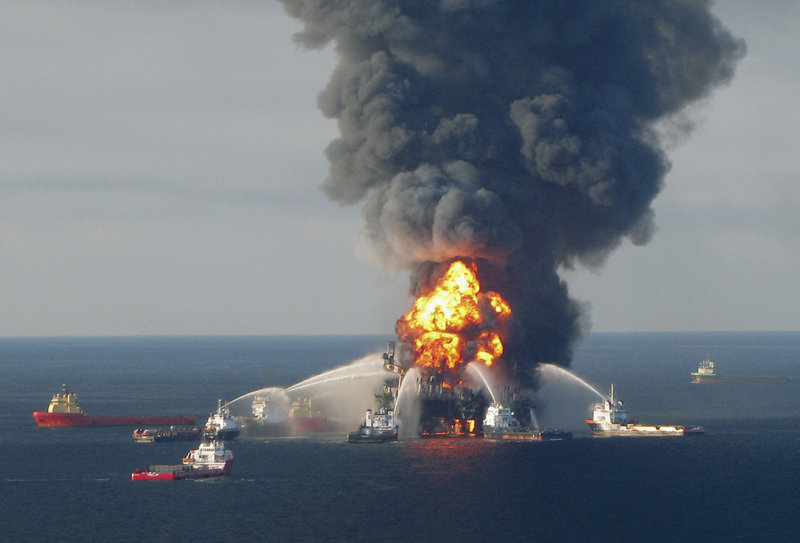One of the biggest legal circuses on Earth — the trial of BP over the extent of its responsibility for the 2010 Gulf of Mexico oil spill — is scheduled to open in New Orleans on Monday, featuring 34 leading lawyers in the jam-packed federal court and hundreds of others listening to video feeds in rooms nearby.
There will be 400 minutes of opening arguments from 11 parties, including the Justice Department. The list of exhibits runs nearly a thousand pages, and lawyers have filed 126 depositions and the names of about 80 potential witnesses. The plaintiffs’ team has essentially built an entire new firm, with 300 lawyers, paralegals and support staffers dedicated to the case. BP has a similar battery of attorneys from four of the nation’s most prestigious firms.
Settlement talks were under way over the weekend. The Wall Street Journal reported that federal and state officials were preparing a $16 billion offer to BP, but that figure is far higher than any figure BP has discussed. Without a deal, opening arguments will begin Monday before Judge Carl Barbier, himself a former plaintiffs lawyer, who will try the case under maritime law and therefore without a jury.
“The Gulf oil spill case, if it does not settle before Monday, will be unlike any other trial brought under the environmental laws,” said David Uhlmann, professor of environmental law at the University of Michigan. “The Justice Department has never tried an environmental case that involved the human tragedy, economic losses and ecological disaster that occurred during the gulf oil spill.”
Ever since the spill, BP has strived to “make things right,” as its ads say, shelling out huge sums to individuals and businesses and in a criminal settlement with the Justice Department in a bid to put the disaster behind it and get on with the business of being an oil company.
But now BP says it is ready to combat charges that it was guilty of gross negligence in the April 20, 2010, blowout on its Macondo exploration well, which set the Deepwater Horizon drilling rig on fire, killing 11 people and spilling millions of barrels of crude oil into the Gulf of Mexico. The London-based oil giant says that a series of mistakes by its own employees and those working for the drill rig’s owner, Transocean, and oil-field services firm Halliburton led to the disaster. Those companies are also defendants in the trial.
An army of private plaintiffs, the Justice Department, state attorneys general and Transocean and Halliburton will all argue that BP is to blame. Issues of damages and penalties will be dealt with later in separate proceedings.
“In a lot of cases it’s the plaintiffs’ versus the defendant’s version. But here, BP’s defense is really to try to hide behind Transocean and Halliburton,” said Steven Herman, one of the lead plaintiffs lawyers and a veteran of tobacco and Chinese drywall litigation. “We think they were all grossly negligent and wanton and reckless, and at the end of the day we don’t’ think any of them could hide behind the others.”
The stakes are enormous. If BP is found guilty of gross rather than simple negligence, it could be forced to pay up to the maximum Clean Water Act fine of $17.5 billion, plus billions more in civil and potentially punitive claims by individuals and businesses who did not accept payments already.
The company, which is disputing the size of the spill, has also stressed that the Clean Water Act fines of $1,100 a barrel in cases of simple negligence and $4,300 a barrel in cases of gross negligence are maximum, not required, fines and that courts generally do not impose maximum penalties.
“We never got anywhere near the statutory maximum,” said Dan Jacobs, a professor at American University’s Kogod School of Business and a former Justice Department lawyer dealing with environmental cases. “But this is not your normal case. You have a super-deep-pocket defendant, egregious violations and a sordid history.”
Said Uhlmann: “If the case goes well for the government, BP could pay more than $10 billion in civil penalties alone. And even if the government fares poorly, BP still will pay the largest civil penalties ever imposed under the environmental laws.”
People familiar with the settlement talks said that bridging the gap between BP and the states of Louisiana and Alabama would be difficult.
“There were too many actors with too many dollars in their eyes,” said one person familiar with talks that took place earlier. He said that the states, “Louisiana in particular,” were “not the only obstacle but the main obstacle.”
Copy the Story Link
Send questions/comments to the editors.



Success. Please wait for the page to reload. If the page does not reload within 5 seconds, please refresh the page.
Enter your email and password to access comments.
Hi, to comment on stories you must . This profile is in addition to your subscription and website login.
Already have a commenting profile? .
Invalid username/password.
Please check your email to confirm and complete your registration.
Only subscribers are eligible to post comments. Please subscribe or login first for digital access. Here’s why.
Use the form below to reset your password. When you've submitted your account email, we will send an email with a reset code.